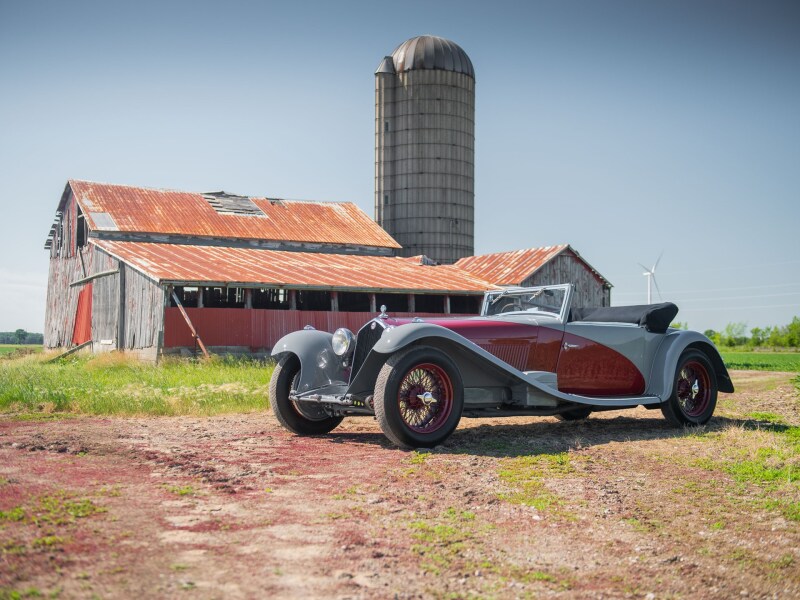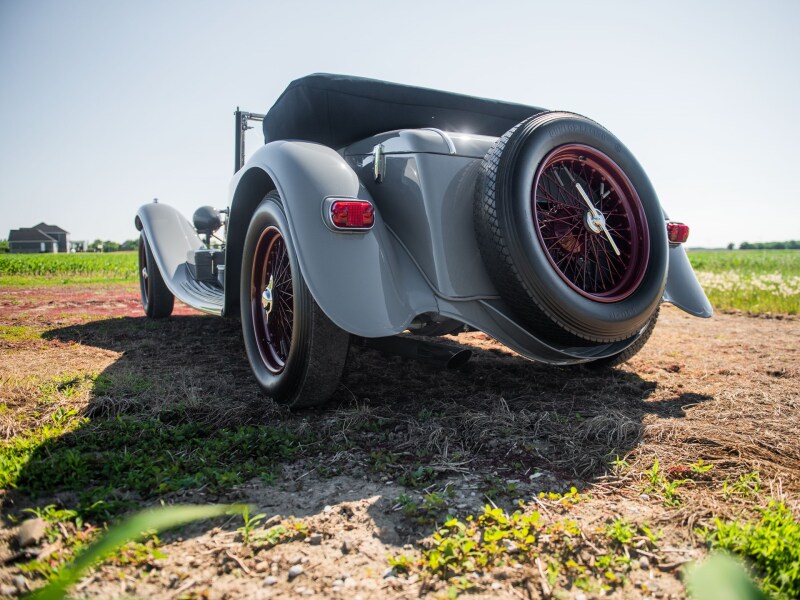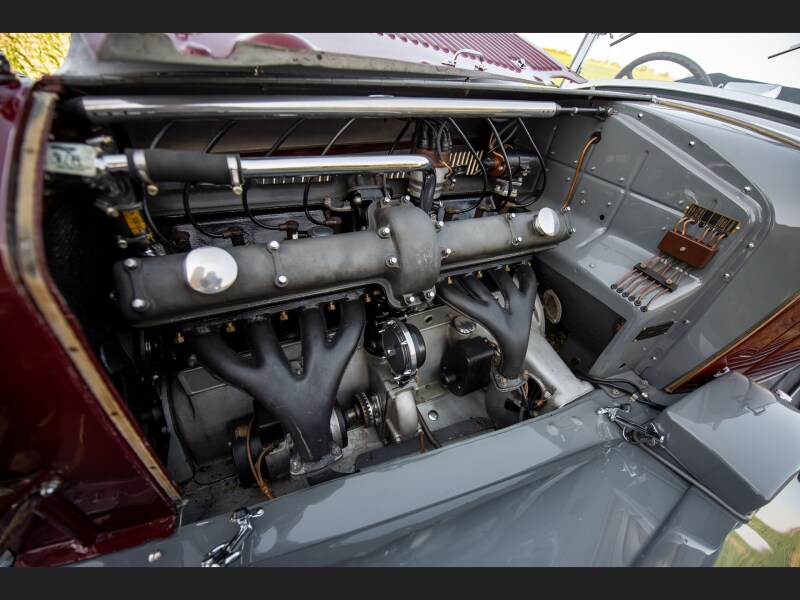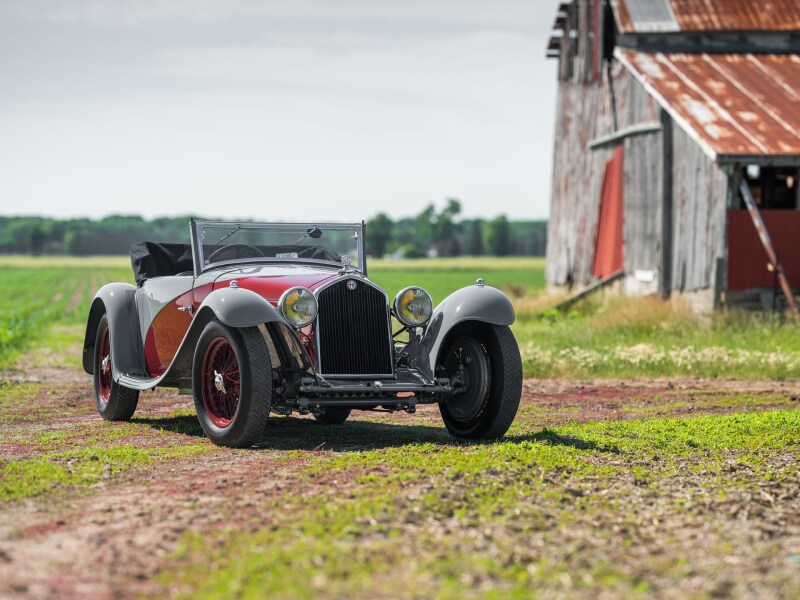/
collectibles








Alfa Romeo
8C 2300 Cabriolet by Figoni
Price upon request
International shipping available
Customs duties and taxes may apply.
Ships from: California, United States
Taxes not included
VAT and other taxes are not reflected in the listed pricing. Read more
Details
Description
An early 1930s supercar; one of the ultimate chassis of its era
• Extraordinarily beautiful coachwork by one of the most revered designers
• Formerly owned by Paul Sac and Robert Rubin; fascinating history
• Well-preserved restoration by Alfa Romeo specialist Chris Leydon
• Eligible for many significant tours and rallies worldwide
THE 2.3
Many fine automobiles have been compared over the years to Swiss watches in the jewel-like precision and complication of their mechanical works. The comparison is seldom more apt than when made to the Alfa Romeo 8C 2300. Under the car’s long snout was tucked an engine composed of two four-cylinder blocks, end to end, with twin overhead camshafts and hemispherical combustion chambers. The 10-main-bearing crankshaft was split in the middle, with a pair of gears at its heart that drove the camshafts, a supercharger, oil and water pumps, and the generator! It was a miraculous piece of engineering, beautiful to behold and, properly set up, seamless in its operation; an 8C 2300 was a marvelous, swift machine to drive, as witnessed by its impressive roster of victories in the great races of the world during the early 1930s.
Typical of Alfa Romeo in this period, the 2.3, as enthusiasts came to know it, was as often beautiful as fast, with coachbuilders delivering the best of their talents on the low, well-proportioned chassis. Among them was Figoni, not yet paired with backer Falaschi but already producing extraordinary pieces that stole little of the lightness and power from the chassis beneath. The great carrosserie delivered bodies on just seven 8C 2300s, all of them shipped as knocked-down kits to France and assembled there under Alfa Romeo auspices; four survive today in essentially their original forms.
THE GOLDET FIGONI
According to the research of marque historian Simon Moore, the history of the car offered here begins as chassis number 2111025, ordered with an especially dynamic cabriolet body by Figoni, distinguished by dual rear-mounted spares and subtle two-toning split by a “sweep panel” through the flanks. It is believed to have first been registered in September 1932, with the body completed in December, and to have been subsequently pictured in the July/August 1933 issue of Auto-Carrosserie.
The body was commissioned directly by the car’s first owner, Roger Goldet, at considerable cost due to special requests made by him, such as the most expensive available Vaumol leather upholstery and unique windshield wipers. Goldet would return the car to Figoni several times for additional work, with each work order identifying the car by its original registration plate, 1613 RG, or a typographically errant variant thereof. Goldet noted to historian Pierre-Yves Laugier, as quoted by Mr. Moore, that the car was “helpful with the girls” and that it was lent to the dressmaker Countess Vera Borea to show at the Concours d’Elegance Femininie en Automobile held on 23 June 1933.
Goldet believed that he sold the car around 1935; one tale is that the buyer was the racing ace Raymond Sommer, and that Sommer left it in the South of France with a lady friend. In any event, Sommer’s eventual ownership of chassis 2111025 is important, as Sommer himself also owned 2311212, which he raced at Le Mans in 1935. Antoine Raffaelli, the famed “Bugatti hunter” of the early post-war years, recounted buying this car from Sommer’s lady friend in 1962 at Chateau Scott; indeed, the car had been registered in the South of France since 10 December 1951.
Raffaelli sold the Alfa Romeo in 1965 to Paul Sac, who had it refinished in two shades of blue by a coachbuilder in Turin by the name of Savio. Sac maintained the car for over two decades before selling it in 1987 to Robert Rubin of New York, then-owner of the Bridgehampton racing circuit and a passionate collector and driver of significant vintage racing machines. Mr. Rubin undertook a complete restoration with the noted Alfa Romeo 8C specialist, Chris Leydon, in which the car was beautifully finished in its present wonderful dove grey and scarlet hues. Prior to completion of the restoration, the car and an Alfa Romeo 8C 2900 were exchanged by Mr. Rubin on a Maserati 8CTF, but new owner Nick Harley had Mr. Leydon complete the work and proceeded to both show the car widely and drive it over 20,000 miles before it was acquired for the present collection in the early 1990s.
STUDYING A CLASSIC
It is fortunate for the buyer of any Alfa Romeo 8C that the cars have been virtually always highly sought after and, thus, accordingly, the history of every example built highly scrutinized, most prominently by Simon Moore in his numerous authoritative works. Research by Mr. Moore, published in The Legendary Alfa Romeo 2.3, indicate that this car was fitted early in life with engine 2311212 and the steering box, number 2151150, and front axle, number 2161144, from the same car, driven by Mr. Sommer at Le Mans; Mr. Moore indicates that the crankcase number of 2221157 was modified to look like 2221257 (a modification without reason as that number is not known to have ever existed in-period) but this has apparently since been restamped. The car was also fitted with a Paris firewall plate stamped with chassis and engine numbers 2311212, of the style and font used on French-delivery 2.3s.
Further, during Mr. Leydon’s restoration, two chassis numbers were located, presumably the original 2111025, on the front of the frame on the passenger side in the typical location for French-delivery cars, and a second number in the usual location behind the driver, somewhat obscured but beginning ‘2221106-.”
These were fast, audacious cars driven by fast, audacious people, and such amalgamations are not uncommon with 8C 2300s. Further, this car retains an astonishing number of original 2.3 components, and remains an automobile of wonderful style, ahead-of-the-curve performance, and history as dramatic and fascinating to behold as its perfect Figoni lines which has existed in this configuration now for over 70 years.
Condition Report
Car Model
Car Style
CCCA Full Classics
- ,
European Sports Cars
- ,
Pre-War European Classics
Region
Country
Year
Color
Grey
- ,
Red
VIN Number
Chassis Number
Engine Number
Conditions of Business
Please note that the cancellation right for EU/UK purchasers applies to this item. Please read Condition 19 of the Buy Now Marketplace Conditions of Business for buyers for more information. Read more here.